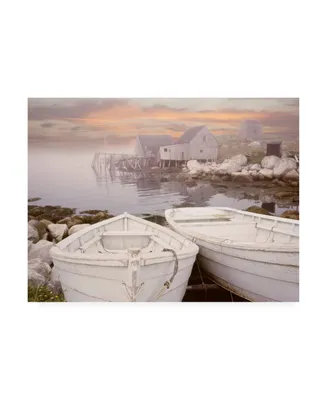Home
Building a Better Boat: How the Cape Island Longliner Saved Nova Scotia's Inshore Fishery
Loading Inventory...
Barnes and Noble
Building a Better Boat: How the Cape Island Longliner Saved Nova Scotia's Inshore Fishery
Current price: $22.95


Barnes and Noble
Building a Better Boat: How the Cape Island Longliner Saved Nova Scotia's Inshore Fishery
Current price: $22.95
Loading Inventory...
Size: Paperback
*Product Information may vary - to confirm product availability, pricing, and additional information please contact Barnes and Noble
The definitive history of the Cape Island–type longliner, a vessel unique to Nova Scotia that helped save its coastal fishery from collapse.
During the first half of the twentieth century, economic recession, a lack of government support, and the incursion of large draggers on coastal fishing grounds meant many inshore fishing communities were facing poverty and starvation. The formation of fishers' cooperatives started a movement toward recovery, and the introduction of the internal combustion engine along with the development of a new medium-sized fishing vessel equipped with mechanical haulers meant groundfishers who had previously employed handlines from small boats with a single hook could now haul multiple trawl lines from a single vessel.
The development of the "government approved" Cape Island–type longliner was perhaps one the most significant achievements in the survival of Nova Scotia's struggling inshore fishery. Sadly, this important history has gone largely unrecorded. With the help of in-depth archival research and more than thirty little-known historical photographs,
Building a Better Boat
chronicles the history of the recovery of the shore fishery and the development of a new fishing craft known as wooden Cape Island–type longliners. It is a story that needs to be told, if for no other reason than to honour the brave fishing families who persevered through poverty and hunger and who, despite all odds, developed a vessel that would help them secure their own futures and that of future generations.
During the first half of the twentieth century, economic recession, a lack of government support, and the incursion of large draggers on coastal fishing grounds meant many inshore fishing communities were facing poverty and starvation. The formation of fishers' cooperatives started a movement toward recovery, and the introduction of the internal combustion engine along with the development of a new medium-sized fishing vessel equipped with mechanical haulers meant groundfishers who had previously employed handlines from small boats with a single hook could now haul multiple trawl lines from a single vessel.
The development of the "government approved" Cape Island–type longliner was perhaps one the most significant achievements in the survival of Nova Scotia's struggling inshore fishery. Sadly, this important history has gone largely unrecorded. With the help of in-depth archival research and more than thirty little-known historical photographs,
Building a Better Boat
chronicles the history of the recovery of the shore fishery and the development of a new fishing craft known as wooden Cape Island–type longliners. It is a story that needs to be told, if for no other reason than to honour the brave fishing families who persevered through poverty and hunger and who, despite all odds, developed a vessel that would help them secure their own futures and that of future generations.


















